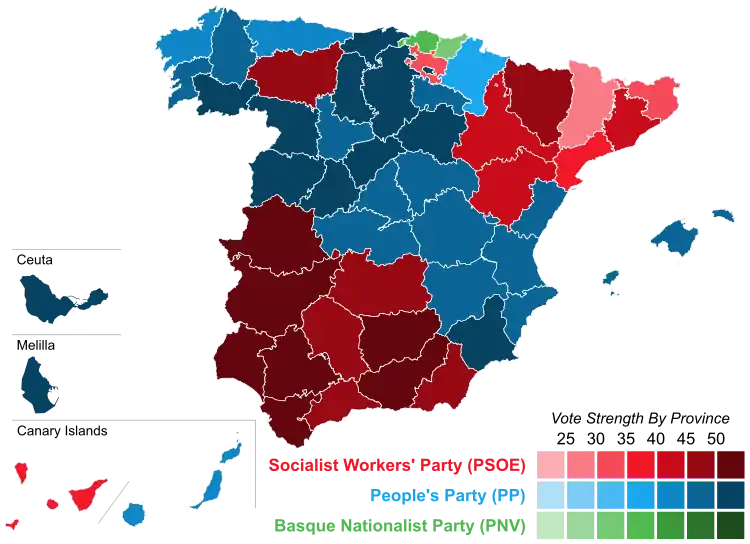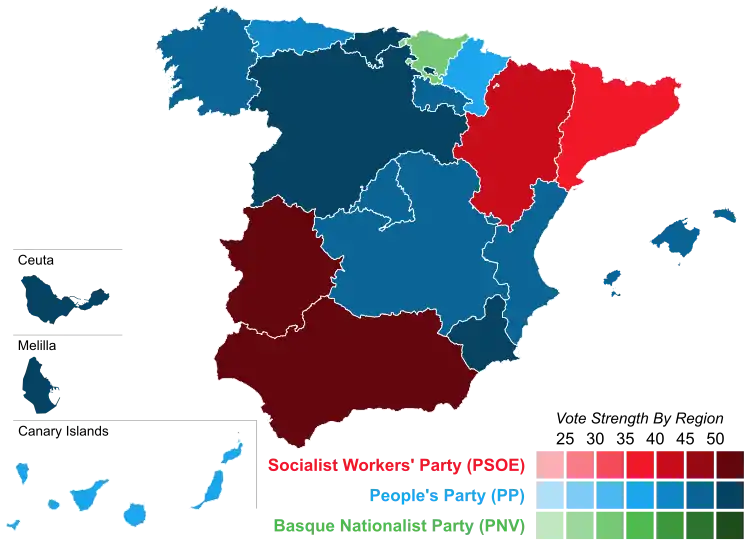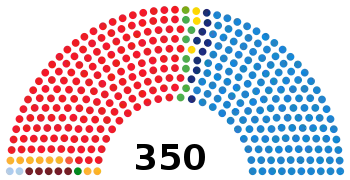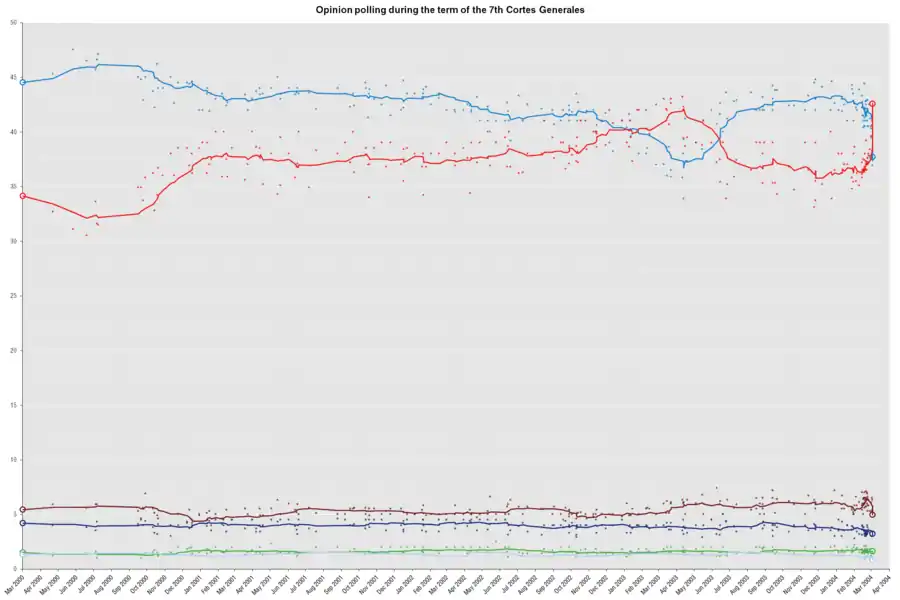2004 Spanish general election
The 2004 Spanish general election was held on Sunday, 14 March 2004, to elect the 8th Cortes Generales of the Kingdom of Spain. All 350 seats in the Congress of Deputies were up for election, as well as 208 of 259 seats in the Senate.
| |||||||||||||||||||||||||||||||||||||||||||||||||||||||||||||||||||||||||||||||||||||||||||||
All 350 seats in the Congress of Deputies and 208 (of 259) seats in the Senate 176 seats needed for a majority in the Congress of Deputies | |||||||||||||||||||||||||||||||||||||||||||||||||||||||||||||||||||||||||||||||||||||||||||||
|---|---|---|---|---|---|---|---|---|---|---|---|---|---|---|---|---|---|---|---|---|---|---|---|---|---|---|---|---|---|---|---|---|---|---|---|---|---|---|---|---|---|---|---|---|---|---|---|---|---|---|---|---|---|---|---|---|---|---|---|---|---|---|---|---|---|---|---|---|---|---|---|---|---|---|---|---|---|---|---|---|---|---|---|---|---|---|---|---|---|---|---|---|---|
| Opinion polls | |||||||||||||||||||||||||||||||||||||||||||||||||||||||||||||||||||||||||||||||||||||||||||||
| Registered | 34,571,831 | ||||||||||||||||||||||||||||||||||||||||||||||||||||||||||||||||||||||||||||||||||||||||||||
| Turnout | 26,155,436 (75.7%) | ||||||||||||||||||||||||||||||||||||||||||||||||||||||||||||||||||||||||||||||||||||||||||||
| |||||||||||||||||||||||||||||||||||||||||||||||||||||||||||||||||||||||||||||||||||||||||||||


| |||||||||||||||||||||||||||||||||||||||||||||||||||||||||||||||||||||||||||||||||||||||||||||
| |||||||||||||||||||||||||||||||||||||||||||||||||||||||||||||||||||||||||||||||||||||||||||||
The electoral outcome was heavily influenced by the aftermath of the Madrid train bombings on 11 March, as a result of which all parties suspended their electoral campaigns.[1] For two days following the attacks, the People's Party (PP) government kept blaming the terrorist organization ETA for the bombings, even in spite of mounting evidence suggesting the involvement of Islamist groups. The government was accused of misinformation, as an Islamist attack would have been perceived as the direct result of Spain's involvement in the Iraq War, which had been highly unpopular among the public.[2][3]
The election result was described by some media as an "unprecedented electoral upset". The perceived abuse of the PP's absolute majority throughout the legislature, with a focus on Spain's involvement in Iraq, was said to have helped fuel a wave of discontent against the incumbent ruling party, with the government's mismanagement on the bombings serving as the final catalyst for change to happen.[4][5] At 11 million votes and 42.6%, the opposition Spanish Socialist Workers' Party (PSOE) increased by 3.1 million its 2000 result, securing 164 seats—a net gain of 39. In contrast, the PP, which opinion polls earlier in the year had predicted would secure a diminished but still commanding victory, lost 35 seats and 7 percentage points, resulting in the worst defeat for a sitting government in Spain up to that point since 1982. The 75.7% turnout was among the highest since the Spanish transition to democracy, with no future general election having exceeded such a figure. The number of votes cast, at 26.1 million votes, remained the highest figure in gross terms for any Spanish general election until the April 2019 election.[6][7]
The day after the election, Zapatero announced his will to form a minority PSOE government, supported by other parties in a confidence and supply basis. Two minor left-wing parties, Republican Left of Catalonia (ERC) and United Left (IU), immediately announced their intention to support Zapatero's government. On 16 April 2004, Zapatero was elected as new prime minister by an outright majority of the new Congress, with 183 out of 350 members voting for him, being sworn in the next day.[8]
Overview
Electoral system
The Spanish Cortes Generales were envisaged as an imperfect bicameral system. The Congress of Deputies had greater legislative power than the Senate, having the ability to vote confidence in or withdraw it from a prime minister and to override Senate vetoes by an absolute majority of votes. Nonetheless, the Senate possessed a few exclusive, yet limited in number functions—such as its role in constitutional amendment—which were not subject to the Congress' override.[9][10] Voting for the Cortes Generales was on the basis of universal suffrage, which comprised all nationals over eighteen and in full enjoyment of their political rights.[11]
For the Congress of Deputies, 348 seats were elected using the D'Hondt method and a closed list proportional representation, with a threshold of three percent of valid votes—which included blank ballots—being applied in each constituency. Parties not reaching the threshold were not taken into consideration for seat distribution. Seats were allocated to constituencies, corresponding to the provinces of Spain, with each being allocated an initial minimum of two seats and the remaining 248 being distributed in proportion to their populations. Ceuta and Melilla were allocated the two remaining seats, which were elected using plurality voting.[9][12] The use of the D'Hondt method might result in a higher effective threshold, depending on the district magnitude.[13]
For the Senate, 208 seats were elected using an open list partial block voting, with electors voting for individual candidates instead of parties. In constituencies electing four seats, electors could vote for up to three candidates; in those with two or three seats, for up to two candidates; and for one candidate in single-member districts. Each of the 47 peninsular provinces was allocated four seats, whereas for insular provinces, such as the Balearic and Canary Islands, districts were the islands themselves, with the larger—Majorca, Gran Canaria and Tenerife—being allocated three seats each, and the smaller—Menorca, Ibiza–Formentera, Fuerteventura, La Gomera, El Hierro, Lanzarote and La Palma—one each. Ceuta and Melilla elected two seats each. Additionally, autonomous communities could appoint at least one senator each and were entitled to one additional senator per each million inhabitants.[9][12]
Election date
The term of each chamber of the Cortes Generales—the Congress and the Senate—expired four years from the date of their previous election, unless they were dissolved earlier. The election decree was required to be issued no later than the twenty-fifth day prior to the date of expiry of the Cortes in the event that the prime minister did not make use of his prerogative of early dissolution. The decree was to be published on the following day in the Official State Gazette (BOE), with election day taking place on the fifty-fourth day from publication. The previous election was held on 12 March 2000, which meant that the legislature's term would expire on 12 March 2004. The election decree was required to be published in the BOE no later than 17 February 2004, with the election taking place on the fifty-fourth day from publication, setting the latest possible election date for the Cortes Generales on Sunday, 11 April 2004.[12]
The prime minister had the prerogative to dissolve both chambers at any given time—either jointly or separately—and call a snap election, provided that no motion of no confidence was in process, no state of emergency was in force and that dissolution did not occur before one year had elapsed since the previous one. Additionally, both chambers were to be dissolved and a new election called if an investiture process failed to elect a prime minister within a two-month period from the first ballot.[9] Barred this exception, there was no constitutional requirement for simultaneous elections for the Congress and the Senate, there being no precedent of separate elections and with governments having long preferred that elections for the two chambers of the Cortes take place simultaneously.
On 9 January 2004, it was announced that the general election would be held on 14 March, with the Cortes to be dissolved on 20 January.[14][15] The election date was agreed with Andalusian president Manuel Chaves, to make it being held concurrently with the 2004 Andalusian regional election.[16]
Parliamentary status
The Cortes Generales were officially dissolved on 20 January 2004, after the publication of the dissolution decree in the Official State Gazette.[17] The tables below show the status of the different parliamentary groups in both chambers at the time of dissolution.[18][19]
|
| ||||||||||||||||||||||||||||||||||||||||||||||||||||||||||||||||||||||||||||||||||||||||||||||||||||||||||||||||||||||||||||||||||||||||||||||||||||||||||||||||||||||||||||||||
Parties and candidates
The electoral law allowed for parties and federations registered in the interior ministry, coalitions and groupings of electors to present lists of candidates. Parties and federations intending to form a coalition ahead of an election were required to inform the relevant Electoral Commission within ten days of the election call, whereas groupings of electors needed to secure the signature of at least one percent of the electorate in the constituencies for which they sought election, disallowing electors from signing for more than one list of candidates.[12]
Below is a list of the main parties and electoral alliances which contested the election:
The Socialists' Party of Catalonia (PSC), Republican Left of Catalonia (ERC) and Initiative for Catalonia Greens (ICV) agreed to continue with the Catalan Agreement of Progress alliance for the Senate with the inclusion of United and Alternative Left (EUiA).[43] In the Balearic Islands, PSM–Nationalist Agreement (PSM–EN), United Left of the Balearic Islands (EUIB), The Greens of the Balearic Islands (EVIB) and ERC formed the Progressives for the Balearic Islands alliance.[44] A proposal for an all-left electoral alliance for the Senate in the Valencian Community, comprising the PSOE, United Left of the Valencian Country (EUPV) and the Valencian Nationalist Bloc (BNV) was ultimately discarded.[45][46][47]
Campaign period
Party slogans
| Party or alliance | Original slogan | English translation | Ref. | |
|---|---|---|---|---|
| PP | « Juntos vamos a más » | "Together we go for more" | [48] | |
| PSOE | « Merecemos una España mejor » | "We deserve a better Spain" | [49] | |
| CiU | « Duran per Catalunya: sentit comú » | "Duran for Catalonia: common sense" | [50][51][52] | |
| IU | « Con tu voto, es posible. Palabra » | "With your vote, it is possible. Promise" | [53] | |
| EAJ/PNV | « Tú tienes la palabra » « Tu voz es importante en Madrid » |
"You have the word" "Your voice is important in Madrid" |
[54] | |
| CC | « Gana Canarias, ganas tú » | "The Canaries win, you win" | [55] | |
| BNG | « Dálle un Sí a Galiza » | "Give a Yes to Galicia" | [54] | |
| PA | « Andalucía es nuestro trabajo » | "Andalusia is our job" | [56] | |
| ERC | « Parlant la gent s'entén » | "People understand [each other] by talking" | [57] | |
| CHA | « Labordeta, gente como tú » | "Labordeta, people like you" | [55] | |
| NaBai | « Orain da geroa! » « ¡Ahora es el futuro! » |
"The future is now!" | [58] | |
Opinion polls
Results
Congress of Deputies
 | ||||||
| Parties and coalitions | Popular vote | Seats | ||||
|---|---|---|---|---|---|---|
| Votes | % | ±pp | Total | +/− | ||
| Spanish Socialist Workers' Party (PSOE) | 11,026,163 | 42.59 | +8.43 | 164 | +39 | |
| People's Party (PP) | 9,763,144 | 37.71 | –6.81 | 148 | –35 | |
| United Left (IU)1 | 1,284,081 | 4.96 | –0.93 | 5 | –4 | |
| Convergence and Union (CiU) | 835,471 | 3.23 | –0.96 | 10 | –5 | |
| Republican Left of Catalonia (ERC) | 652,196 | 2.52 | +1.68 | 8 | +7 | |
| Basque Nationalist Party (EAJ/PNV)2 | 420,980 | 1.63 | +0.13 | 7 | ±0 | |
| Canarian Coalition (CC) | 235,221 | 0.91 | –0.16 | 3 | –1 | |
| Galician Nationalist Bloc (BNG) | 208,688 | 0.81 | –0.51 | 2 | –1 | |
| Andalusian Party (PA) | 181,868 | 0.70 | –0.19 | 0 | –1 | |
| Aragonese Union (CHA) | 94,252 | 0.36 | +0.03 | 1 | ±0 | |
| Basque Solidarity (EA)2 | 80,905 | 0.31 | –0.06 | 1 | ±0 | |
| The Eco-pacifist Greens (LVEP) | 68,027 | 0.26 | +0.16 | 0 | ±0 | |
| The Greens–The Ecologist Alternative (EV–AE) | 30,528 | 0.12 | New | 0 | ±0 | |
| Navarre Yes (NaBai)3 | 61,045 | 0.24 | +0.15 | 1 | +1 | |
| Valencian Nationalist Bloc–Green Left (Bloc–EV) | 40,759 | 0.16 | –0.09 | 0 | ±0 | |
| Progressives for the Balearic Islands (PSM–EN, EU, EV, ER)4 | 40,289 | 0.16 | –0.06 | 0 | ±0 | |
| Citizens for Blank Votes (CenB) | 40,208 | 0.16 | New | 0 | ±0 | |
| Aralar–Stand up (Aralar–Zutik) | 38,560 | 0.15 | New | 0 | ±0 | |
| Aragonese Party (PAR) | 36,540 | 0.14 | –0.03 | 0 | ±0 | |
| Democratic and Social Centre (CDS) | 34,101 | 0.13 | +0.03 | 0 | ±0 | |
| Socialist Party of Andalusia (PSA) | 24,127 | 0.09 | New | 0 | ±0 | |
| Humanist Party (PH) | 21,758 | 0.08 | ±0.00 | 0 | ±0 | |
| The Greens of the Community of Madrid (LVCM) | 19,600 | 0.08 | –0.01 | 0 | ±0 | |
| Republican Left (IR) | 16,993 | 0.07 | New | 0 | ±0 | |
| Cannabis Party for Legalisation and Normalisation (PCLyN) | 16,918 | 0.07 | New | 0 | ±0 | |
| Family and Life Party (PFyV) | 16,699 | 0.06 | New | 0 | ±0 | |
| The Greens (Verdes) | 15,220 | 0.06 | ±0.00 | 0 | ±0 | |
| The Greens of Extremadura (LV) | 3,133 | 0.01 | ±0.00 | 0 | ±0 | |
| National Democracy (DN) | 15,180 | 0.06 | New | 0 | ±0 | |
| Leonese People's Union (UPL) | 14,160 | 0.05 | –0.13 | 0 | ±0 | |
| Communist Party of the Peoples of Spain (PCPE) | 12,979 | 0.05 | –0.01 | 0 | ±0 | |
| The Greens–Green Group (LV–GV) | 12,749 | 0.05 | –0.04 | 0 | ±0 | |
| Spanish Phalanx of the CNSO (FE–JONS)5 | 12,266 | 0.05 | +0.02 | 0 | ±0 | |
| Majorcan Union (UM) | 10,558 | 0.04 | ±0.00 | 0 | ±0 | |
| The Phalanx (FE) | 10,311 | 0.04 | –0.02 | 0 | ±0 | |
| Commoners' Land–Castilian Nationalist Party (TC–PNC) | 8,866 | 0.03 | –0.05 | 0 | ±0 | |
| Internationalist Socialist Workers' Party (POSI) | 8,003 | 0.03 | –0.02 | 0 | ±0 | |
| Republican Social Movement (MSR) | 6,768 | 0.03 | New | 0 | ±0 | |
| Spanish Democratic Party (PADE) | 5,677 | 0.02 | –0.02 | 0 | ±0 | |
| Convergence of Democrats of Navarre (CDN) | 5,573 | 0.02 | –0.02 | 0 | ±0 | |
| Authentic Phalanx (FA) | 4,589 | 0.02 | New | 0 | ±0 | |
| Asturianist Party (PAS) | 4,292 | 0.02 | –0.01 | 0 | ±0 | |
| Spain 2000 (E–2000) | 4,231 | 0.02 | –0.02 | 0 | ±0 | |
| Canarian Nationalist Party (PNC) | 4,092 | 0.02 | New | 0 | ±0 | |
| United Extremadura (EU) | 3,916 | 0.02 | ±0.00 | 0 | ±0 | |
| Party of Self-employed and Professionals (AUTONOMO) | 3,124 | 0.01 | –0.01 | 0 | ±0 | |
| Initiative for the Development of Soria (IDES) | 2,934 | 0.01 | New | 0 | ±0 | |
| Andalusia Assembly (A) | 2,930 | 0.01 | ±0.00 | 0 | ±0 | |
| Canarian Popular Alternative (APCa) | 2,715 | 0.01 | New | 0 | ±0 | |
| European Green Group (GVE) | 2,662 | 0.01 | New | 0 | ±0 | |
| Independent Candidacy–The Party of Castile and León (CI–PCL) | 2,421 | 0.01 | –0.01 | 0 | ±0 | |
| Unsubmissive Seats–Alternative of Discontented Democrats (Ei–ADD) | 2,332 | 0.01 | New | 0 | ±0 | |
| Party of the Democratic Karma (PKD) | 2,300 | 0.01 | ±0.00 | 0 | ±0 | |
| Galician People's Front (FPG) | 2,257 | 0.01 | ±0.00 | 0 | ±0 | |
| Galician Coalition (CG) | 2,235 | 0.01 | ±0.00 | 0 | ±0 | |
| Alliance for Development and Nature (ADN) | 2,215 | 0.01 | New | 0 | ±0 | |
| Party of Precarious Workers (PTPRE) | 2,115 | 0.01 | New | 0 | ±0 | |
| Kingdom of Valencia Identity (IRV) | 2,111 | 0.01 | New | 0 | ±0 | |
| Party of Self-employed, Retirees and Widows (PAE) | 2,082 | 0.01 | ±0.00 | 0 | ±0 | |
| Andecha Astur (AA) | 1,970 | 0.01 | ±0.00 | 0 | ±0 | |
| Union of the Salamancan People (UPSa) | 1,871 | 0.01 | New | 0 | ±0 | |
| The Greens–Green Alternative (EV–AV) | 1,836 | 0.01 | –0.04 | 0 | ±0 | |
| Carlist Party (PC) | 1,813 | 0.01 | ±0.00 | 0 | ±0 | |
| Romantic Mutual Support Party (PMAR) | 1,561 | 0.01 | New | 0 | ±0 | |
| Cantabrian Nationalist Council (CNC) | 1,431 | 0.01 | ±0.00 | 0 | ±0 | |
| Salamanca–Zamora–León–PREPAL (PREPAL) | 1,322 | 0.01 | ±0.00 | 0 | ±0 | |
| Another Democracy is Possible (ODeP) | 1,302 | 0.01 | New | 0 | ±0 | |
| Independent Social Group (ASI) | 1,237 | 0.00 | New | 0 | ±0 | |
| Independent Social Democratic Party of the Valencian Community (PSICV) | 1,096 | 0.00 | New | 0 | ±0 | |
| Republican Party (PRF) | 1,051 | 0.00 | New | 0 | ±0 | |
| Alternative for Gran Canaria (AxGC) | 957 | 0.00 | New | 0 | ±0 | |
| Alliance for National Unity (AUN) | 923 | 0.00 | New | 0 | ±0 | |
| Left Assembly–Initiative for Andalusia (A–IZ) | 901 | 0.00 | New | 0 | ±0 | |
| Christian Positivist Party (PPCr) | 892 | 0.00 | ±0.00 | 0 | ±0 | |
| Asturian Left (IAS) | 854 | 0.00 | ±0.00 | 0 | ±0 | |
| Socialist Party of the People of Ceuta (PSPC) | 807 | 0.00 | ±0.00 | 0 | ±0 | |
| Liberal Centrist Union (UCL) | 798 | 0.00 | New | 0 | ±0 | |
| Caló Nationalist Party (PNCA) | 757 | 0.00 | –0.01 | 0 | ±0 | |
| United Zamora (ZU) | 754 | 0.00 | New | 0 | ±0 | |
| Union of Centrists of Menorca (UCM) | 751 | 0.00 | New | 0 | ±0 | |
| Internationalist Struggle (LI (LIT–CI)) | 668 | 0.00 | –0.01 | 0 | ±0 | |
| Spanish Democratic Front (FDE) | 619 | 0.00 | New | 0 | ±0 | |
| Castilian Unity (UdCa) | 601 | 0.00 | New | 0 | ±0 | |
| Andalusian Social Democratic Party (PSDA) | 583 | 0.00 | New | 0 | ±0 | |
| Nationalist Maga Alternative (AMAGA) | 468 | 0.00 | New | 0 | ±0 | |
| Balearic People's Union (UPB) | 411 | 0.00 | ±0.00 | 0 | ±0 | |
| European Nation State (N) | 410 | 0.00 | ±0.00 | 0 | ±0 | |
| Workers for Democracy Coalition (TD) | 407 | 0.00 | New | 0 | ±0 | |
| National Workers' Party (PNT) | 379 | 0.00 | New | 0 | ±0 | |
| Party of The People (LG) | 378 | 0.00 | New | 0 | ±0 | |
| Regionalist Party of Guadalajara (PRGU) | 330 | 0.00 | ±0.00 | 0 | ±0 | |
| National Union (UN) | 318 | 0.00 | ±0.00 | 0 | ±0 | |
| Citizens' Convergence of the South-East (CCSE) | 308 | 0.00 | ±0.00 | 0 | ±0 | |
| National Democratic Party of Spain (PDNE) | 232 | 0.00 | New | 0 | ±0 | |
| Spanish Absolute Honesty Political Group (GPHAE) | 52 | 0.00 | New | 0 | ±0 | |
| Blank ballots | 407,795 | 1.58 | ±0.00 | |||
| Total | 25,891,299 | 350 | ±0 | |||
| Valid votes | 25,891,299 | 98.99 | –0.33 | |||
| Invalid votes | 264,137 | 1.01 | +0.33 | |||
| Votes cast / turnout | 26,155,436 | 75.66 | +6.95 | |||
| Abstentions | 8,416,395 | 24.34 | –6.95 | |||
| Registered voters | 34,571,831 | |||||
| Sources[59][60] | ||||||
Senate
 | |||||
| Parties and coalitions | Directly elected |
Reg. app. |
Total | ||
|---|---|---|---|---|---|
| Seats | +/− | ||||
| People's Party (PP) | 102 | –25 | 24 | 126 | |
| Valencian Union (UV) | 1 | +1 | 0 | 1 | |
| Spanish Socialist Workers' Party (PSOE) | 81 | +28 | 15 | 96 | |
| Catalan Agreement of Progress (PSC–ERC–ICV–EUiA) | 12 | +4 | 4 | 16 | |
| Initiative for Catalonia Greens–EUiA (ICV–EUiA) | 1 | +1 | 1 | 2 | |
| Basque Nationalist Party (EAJ/PNV) | 6 | ±0 | 1 | 7 | |
| Convergence and Union (CiU) | 4 | –4 | 2 | 6 | |
| Democratic Union of Catalonia (UDC) | 0 | –2 | 1 | 1 | |
| Canarian Coalition (CC) | 3 | –2 | 1 | 4 | |
| Majorera Assembly (AM) | 0 | –1 | 0 | 0 | |
| United Left (IU) | 0 | ±0 | 2 | 2 | |
| Galician Nationalist Bloc (BNG) | 0 | ±0 | 1 | 1 | |
| Aragonese Party (PAR) | 0 | ±0 | 1 | 1 | |
| Lanzarote Independents Party (PIL) | 0 | –1 | 0 | 0 | |
| Total | 208 | ±0 | 51 | 259 | |
| Sources[19][60][61][62] | |||||
Aftermath
| Investiture José Luis Rodríguez Zapatero (PSOE) | ||
| Ballot → | 16 April 2004 | |
|---|---|---|
| Required majority → | 176 out of 350 | |
183 / 350 | ||
No
|
148 / 350 | |
19 / 350 | ||
| Absentees | 0 / 350 | |
| Sources[63] | ||
Notes
- Results for United Left (5.45%) and Initiative for Catalonia–Greens (0.51%) in the 2000 election.
- 3 BNG, 1 PA, 1 ERC, 1 EA, 1 CHA, 1 ICV, 1 independent (ex-PSOE).
- Cristina Alberdi, former PSOE legislator.[21]
- Enrique Bellido, former PP legislator.[23]
- The Socialists' Party of Catalonia (7 senators), Republican Left of Catalonia (1 senator) and Initiative for Catalonia Greens (0 senators) contested the 2000 Senate election within the Catalan Agreement of Progress alliance.
- Results for Basque Nationalist Party in the 2000 election, not including Navarre.
- Results for Eusko Alkartasuna in the 2000 election, not including Navarre.
- Results for Eusko Alkartasuna (0.06%) and Basque Nationalist Party in Navarre (0.03%) in the 2000 election.
- The Catalan Agreement of Progress only fielded candidates for the Senate election.
References
- "Los partidos suspenden la campaña electoral" (in Spanish). Cadena SER. 11 March 2004. Retrieved 28 January 2019.
- "Protestas en las sedes del PP por los atentados del 11M" (in Spanish). RTVE. 13 March 2004. Retrieved 28 January 2019.
- "El 91% de los españoles rechaza la intervención militar en Irak, según el CIS". El País (in Spanish). 28 March 2003. Retrieved 28 January 2019.
- "El voto de castigo dio la victoria al PSOE, según la prensa". El País (in Spanish). 15 March 2004. Retrieved 28 January 2019.
- "Zapatero atribuye su victoria a las "ganas de cambio en España" y no al atentado del 11-M". El País (in Spanish). 16 March 2004. Retrieved 28 January 2019.
- "El PSOE da el gran vuelco electoral". El País (in Spanish). 15 March 2004. Retrieved 28 January 2019.
- "Zapatero vence con casi 11 millones de votos". El País (in Spanish). 15 March 2004. Retrieved 28 January 2019.
- "Zapatero, investido presidente del Gobierno con mayoría absoluta". ABC (in Spanish). 16 April 2004. Retrieved 28 January 2019.
- "Constitución Española". Act of 29 December 1978. Boletín Oficial del Estado (in Spanish). Retrieved 27 December 2016.
- "Constitución española, Sinopsis artículo 66". Congress of Deputies (in Spanish). Retrieved 12 September 2020.
- Carreras, Albert; Tafunell, Xavier; Soler, Raimon; Fontana, Josep (2005) [1989]. Estadísticas históricas de España, siglos XIX-XX (PDF) (in Spanish). 1 (II ed.). Bilbao: Fundación BBVA. p. 1077. ISBN 84-96515-00-1. Archived from the original (PDF) on 24 September 2015.
- "Ley Orgánica 5/1985, de 19 de junio, del Régimen Electoral General". Organic Law No. 5 of 19 June 1985. Boletín Oficial del Estado (in Spanish). Retrieved 28 December 2016.
- Gallagher, Michael (30 July 2012). "Effective threshold in electoral systems". Trinity College, Dublin. Archived from the original on 30 July 2017. Retrieved 22 July 2017.
- "Aznar disolverá el Parlamento el día 19 y convocará elecciones para el 14 de marzo". El País (in Spanish). 10 January 2004. Retrieved 4 February 2020.
- "Aznar convoca las elecciones y advierte de que sería un riesgo votar al PSOE". El País (in Spanish). 20 January 2004. Retrieved 4 February 2020.
- "Chaves pacta con Aznar simultanear el 14 de marzo las elecciones andaluzas y generales". El País (in Spanish). 10 January 2004. Retrieved 4 February 2020.
- "Real Decreto 100/2004, de 19 de enero, de disolución del Congreso de los Diputados y del Senado y de convocatoria de elecciones" (PDF). Boletín Oficial del Estado (in Spanish) (17): 2115–2116. 20 January 2004. ISSN 0212-033X.
- "Grupos Parlamentarios en el Congreso de los Diputados y el Senado". Historia Electoral.com (in Spanish). Retrieved 15 March 2019.
- "Composición del Senado 1977-2020". Historia Electoral.com (in Spanish). Retrieved 15 March 2019.
- "Parliamentary Groups". Congress of Deputies (in Spanish). Retrieved 7 December 2020.
- "La ex ministra Alberdi se va del PSOE tras 5 meses de disputa". Diario de Córdoba (in Spanish). 17 December 2003. Retrieved 4 February 2020.
- "Parliamentary Groups since 1977". www.senado.es (in Spanish). Senate of Spain. Retrieved 8 July 2020.
- "Bellido deja la presidencia de la Comisión de Sanidad". El País (in Spanish). 5 September 2002. Retrieved 4 February 2020.
- "Rajoy asume el legado de Aznar tras ser ratificado como candidato del PP a La Moncloa". El País (in Spanish). 2 September 2003. Retrieved 27 January 2019.
- "UV renuncia a sus siglas y Chiquillo irá en la lista del PP al Senado". El País (in Spanish). 29 January 2004. Retrieved 27 January 2019.
- "Juan José Imbroda candidato indiscutible". Melilla Hoy (in Spanish). 21 February 2017. Retrieved 4 February 2020.
- "Zapatero: "Quitaré el poder a los poderosos y haré un país para todos"". El País (in Spanish). 28 October 2002. Retrieved 27 January 2019.
- "Los Verdes concurrirán con el PSOE a las elecciones generales". El País (in Spanish). 11 January 2004. Retrieved 27 January 2019.
- "Ciutadans pel Canvi se lamenta de no figurar en las listas del PSC a las generales". El País (in Spanish). 27 January 2004. Retrieved 4 February 2020.
- "IU cierra su etapa de división y reelige a Llamazares con el 76,5% de los votos". El País (in Spanish). 22 December 2003. Retrieved 27 January 2019.
- "Duran se afianza como cabeza de lista de CiU en las generales de 2004". El País (in Spanish). 30 November 2001. Retrieved 27 January 2019.
- "Los partidos arrancan la precampaña como una reválida de las autonómicas". El País (in Spanish). 25 January 2004. Retrieved 4 February 2020.
- "PNV y EA concurrirán por separado a los comicios de marzo". El País (in Spanish). 27 January 2004. Retrieved 4 February 2020.
- "El sustituto probable de Anasagasti". El País (in Spanish). 16 February 2004. Retrieved 4 February 2020.
- "Carod-Rovira deja la Generalitat y se mantiene el tripartito en Cataluña" (in Spanish). Cadena SER. 28 January 2004. Retrieved 4 February 2020.
- "El líder de ERC buscará en las urnas el refrendo a sus gestiones ante ETA". El País (in Spanish). 28 January 2004. Retrieved 4 February 2020.
- "Carod desvincula su futuro del resultado de ERC en las elecciones legislativas". El País (in Spanish). 15 February 2004. Retrieved 4 February 2020.
- "Aralar ve difícil coligarse con EA para las elecciones". El País (in Spanish). 15 January 2004. Retrieved 27 January 2019.
- "Los partidos nacionalistas irán por separado a las elecciones generales". El País (in Spanish). 25 January 2004. Retrieved 27 January 2019.
- "PNV, EA y Aralar irán juntos a las elecciones generales en Navarra". El País (in Spanish). 24 December 2003. Retrieved 27 January 2019.
- "Una periodista encabezará la lista nacionalista navarra". El País (in Spanish). 7 January 2004. Retrieved 4 February 2020.
- "En Navarra sí, en Euskadi no". El País (in Spanish). 25 January 2004. Retrieved 27 January 2019.
- "Obstáculos en la Entesa". El País (in Spanish). 23 January 2004. Retrieved 27 January 2019.
- "El PSM propone a Nanda Ramon para encabezar la lista al Congreso". Última Hora (in Spanish). 24 December 2003. Retrieved 27 January 2019.
- "EU propone una lista conjunta de la izquierda para el Senado". El País (in Spanish). 23 October 2003. Retrieved 4 February 2020.
- "El Bloc propone una plataforma valencianista para las elecciones". El País (in Spanish). 27 October 2003. Retrieved 4 February 2020.
- "Pla estudiará la oferta de EU para ir en una lista conjunta al Senado". El País (in Spanish). 28 October 2003. Retrieved 4 February 2020.
- "El PP mantiene el lema 'Juntos vamos a más' pese a coincidir con el eslogan de una caja andaluza". El Mundo (in Spanish). 26 February 2004. Retrieved 24 January 2019.
- "El PSOE presenta su campaña para el 14-M bajo el lema 'Merecemos una España mejor'". El País (in Spanish). 12 February 2004. Retrieved 24 January 2019.
- "CiU incorporà l'eslògan "Prou de fer mal a Catalunya" com a resposta a l'"afer Carod"" (in Spanish). CCMA. 26 February 2004. Retrieved 24 January 2019.
- "Duran garantiza que PP y PSOE 'sudarán' por el apoyo de CiU". El Mundo (in Spanish). 27 February 2004. Retrieved 24 January 2019.
- "Los carteles de Convergència y de Unió para las elecciones generales desde 1982". El Periódico de Catalunya (in Spanish). 17 December 2015. Retrieved 19 February 2019.
- "Los lemas que ganaron elecciones". ciudadanosencrisis.wordpress.com (in Spanish). Ciudadanos en crisis. 8 November 2011. Retrieved 24 January 2019.
- "La campaña electoral arranca esta noche con el estreno de los líderes de los principales partidos". El Mundo (in Spanish). 26 February 2004. Retrieved 25 January 2019.
- "Rajoy en Santiago y Zapatero en Madrid abren una campaña marcada por ETA" (in Spanish). Cadena SER. 26 February 2004. Retrieved 24 January 2019.
- "'Andalucía es nuestro trabajo', nuevo lema electoral del PA". El País (in Spanish). 11 July 2003. Retrieved 25 January 2019.
- "Del Fòrum a la consulta". El Periódico de Catalunya (in Spanish). 5 May 2014. Retrieved 24 January 2019.
- "Orain da GEROA". zabaltzen.net (in Spanish). Zabaltzen. 17 November 2011. Retrieved 25 January 2019.
- "Electoral Results Consultation. Congress. March 2004. National totals". Ministry of the Interior (in Spanish). Retrieved 24 September 2017.
- "Elecciones Generales 14 de marzo de 2004". Historia Electoral.com (in Spanish). Retrieved 24 September 2017.
- "Electoral Results Consultation. Senate. March 2004. National totals". Ministry of the Interior (in Spanish). Retrieved 24 September 2017.
- "Elecciones al Senado 2004". Historia Electoral.com (in Spanish). Retrieved 24 September 2017.
- "Congreso de los Diputados: Votaciones más importantes". Historia Electoral.com (in Spanish). Retrieved 28 September 2017.
Bibliography
- Chari, Raj (November 2004). "The 2004 Spanish Election: Terrorism as a Catalyst for Change?". West European Politics. 27 (5): 954–963. doi:10.1080/0140238042000283247.
.jpg.webp)
.jpg.webp)
.jpg.webp)
.jpg.webp)
.jpg.webp)
.jpg.webp)
-1.jpg.webp)


.jpg.webp)
